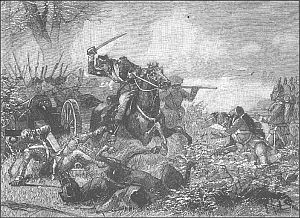Benedict Arnold: Two Sides of a Bitter Coin
Part 2: Wartime Heroics Arnold enlisted in the militia and fought in the French and Indian War, at the disastrous (for the British and the Americans) Battle of Fort William Henry. His return to the business world was the addition to bookselling to his pharmacy trade. At this time, his surviving sister, Hannah, came to live and work with him. (She would continue to do both after he got married, in 1767.) Arnold and his business suffered much from the implementation of the Stamp Act, and he protested it by smuggling and by publicly calling for its repeal. Incensed by Great Britain's arrogance regarding taxation, Arnold joined the Sons of Liberty. Desperate to keep his business alive, he traveled to various ports, including the West Indies, where he was on the night of the Boston Massacre. The incident strengthened Arnold's resolve to stand up for the rights of himself, his business, and his fellow Americans. When the call for volunteers for state militias went out, Arnold answered, becoming a member of the Connecticut militia.
Arnold had help in this endeavor from Ethan Allen and the Green Mountain Boys, who generally get most of the credit for this brilliant military success, despite the fact that Arnold devised the plan and led men to carry it out. This would not be the last time that Arnold would be in someone's shadow. After a dispute over leadership in the wake of the capture of Fort Ticonderoga, Arnold resigned his commission in the Massachusetts militia and returned home. His wife had died at home during his struggle to take the fort, and he mourned her death for a period of time. Arnold couldn't stay away from the limelight long, however, and volunteered to take part in an expedition to invade Canada. Not liking the plan on offer, Arnold devised his own and sold it to Continental Army commander George Washington, who gave Arnold the title of colonel and more than a thousand men. As it turned out, both forces landed in Quebec about the same time, and a fierce battle ensued. During the battle, Arnold was wounded in the leg, an injury that would plague him the rest of his life. British troops held onto Quebec, and Arnold became military commander of American forces in Montreal. That city eventually returned to British control, and Arnold returned to the colonies, to assume a role in protecting Rhode Island. Here again, Arnold, put in charge of the defense of a colony, was passed over for appointment to major general, which others who had less military service received. Again incensed, Arnold tried to resign, but Washington wouldn't accept the resignation, primarily because he knew that Arnold had battlefield smarts. Washington ordered Arnold to New York, where he eventually played a major part in the American victory at the Battle of Saratoga.
Next page > Final Choices > Page 1, 2, 3 |
|
Social Studies for Kids
copyright 2002–2025
David White



 This was the victory that brought France into the war on the side of the Americans, and Saratoga might have turned out differently if Arnold had followed his orders. A series of disputes between Arnold and commanding general Horatio Gates resulted in Arnold's being removed from his field command and confined to his quarters. During the battle, however, Arnold, despite Gates's orders to the contrary, rushed onto the field and led the troops to victory. Gates was angry at Arnold but not as angry as he would have been if the gamble hadn't worked.
This was the victory that brought France into the war on the side of the Americans, and Saratoga might have turned out differently if Arnold had followed his orders. A series of disputes between Arnold and commanding general Horatio Gates resulted in Arnold's being removed from his field command and confined to his quarters. During the battle, however, Arnold, despite Gates's orders to the contrary, rushed onto the field and led the troops to victory. Gates was angry at Arnold but not as angry as he would have been if the gamble hadn't worked.
